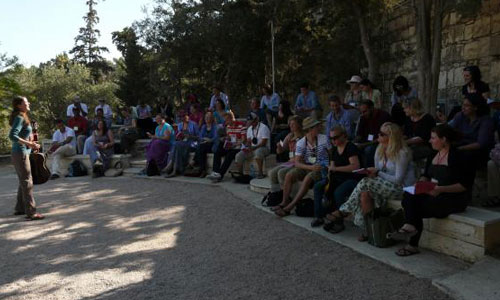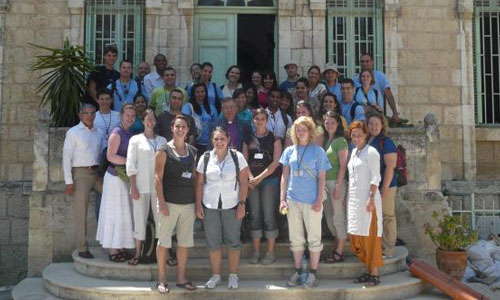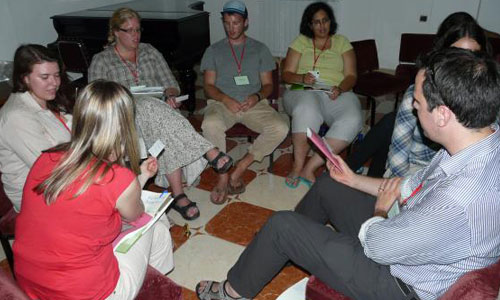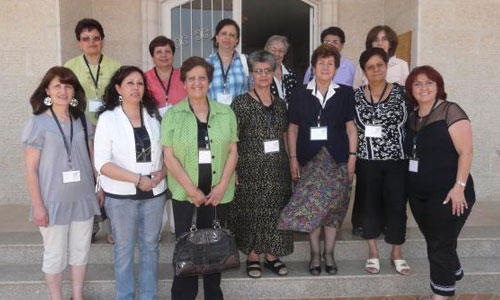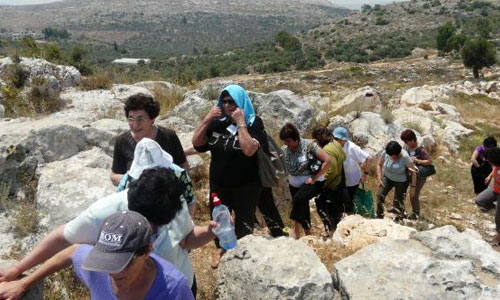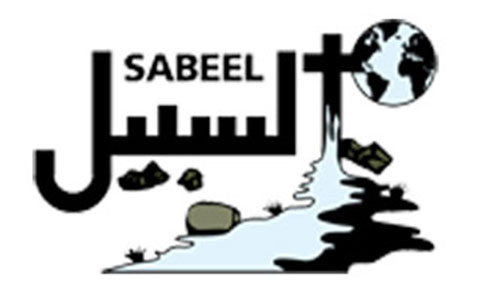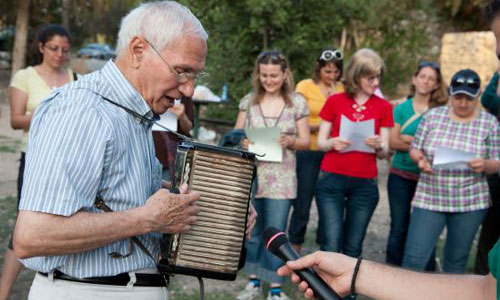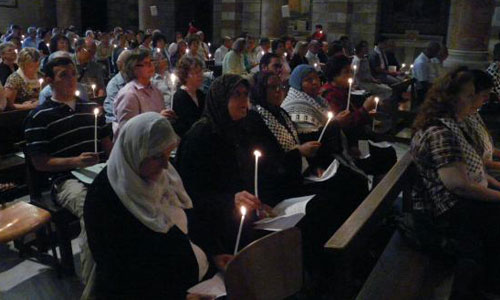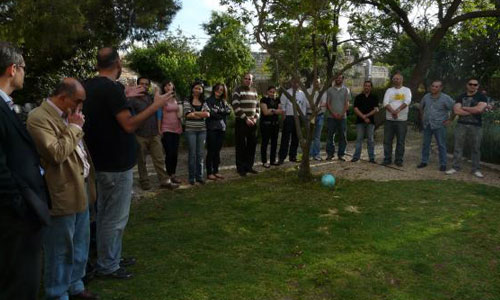
Easter Barbecue
On Friday May 6th 2011, Sabeel had its Easter barbecue at the St. Andrews compound. This gathering of young Palestinian Christians and internationals came together for the first time after Easter to celebrate Jesus’ resurrection with some good food and company. The group initiated the meeting by gathering together in a circle and singing some hymns such as
the Lord’s Prayer and the Lord Has Risen.
Some of the food offered included kebabs and chicken along with salad and the traditional pita bread and hummus dip. Later, sweet desserts were enjoyed such as coffee cake, scones and harisseh.
As the afternoon came to a close, the evening chill eventually convinced some to participate in some fun ball playing, entertaining as much to the players as to the spectators. The sense of community could be felt as people mingled, sharing stories and laughs, some meeting for the first time.
Diversity was in abundance, with Palestinian Christians of all denominations present, along with American and European participants and members of EAPPI.
The evening chill posed no threat to the good time enjoyed by those who attended Sabeel’s 2011 Easter barbecue.
Sports Activity day
On Thursday, May 26th 2011, Sabeel members met at the “Collège des Frères” School in Beit Hanina to enjoy some evening sports activities. This sports activity gathering as welcomed as a stress reliever, due to difficulties of life under Israeli occupation. Some daily habits such as drinking coffee and eating fast food also impact health so the evening provided an opportunity to engage in physical
activity.
People glided onto the court, rotating between playing basketball, volleyball and football. True to typical male behavior, the guys enjoyed shouting while throwing balls across the court, in sure demonstration
of their might. The girls, being more serene, enjoyed shooting hoops in a laid back fashion, chatting with one another. Despite being tired after a long day, the couple of hours spent in sport activities was enjoyable and entertaining in a number of ways; a great way to release stress at the end of the day.
Galilee Trip
On the week-end of May 28th and 29th, Sabeel members went on a trip to the Galilee to visit several towns. The trip’s main destination was the northern town of Al Bassa, home to Christian and Muslim Palestinians until they were ethnically cleansed by Israelis in the Nakba– or catastrophe–of 1948. In 1948, the city and most of the buildings were destroyed except for two churches and a mosque. The native Palestinian inhabitants were mostly pushed north towards Lebanon. Every year, volunteers come to clean the Orthodox church–which is continuously used as a stable for cows and sheep–and this year it was Sabeel’s purpose
to clean both its interior and exterior premises.
The trip’s first stop was in Nazareth, where members enjoyed Mana-eesh zaatar or cheese for breakfast; small pizza-like bread with either zaatar spice or cheese on it. Members of Sabeel Nazareth were also picked up to join the rest of the
group on its adventure.
The bus then arrived at Al Bassa, and reached the location of the Orthodox church remains. Upon arrival, pictures were snapped, however, within minutes, Sabeel members were ready– brooms, buckets and rakes in hand– to start cleaning the church. In front of the church, bushes and overgrown branches obstructed the entrance to the church.
There were no actual steps to get inside the church, so blocks of cement were used to enter. Inside, the church’s deterioration was apparent, and dirt and debris covered the floor. As volunteers chose tasks, buckets quickly filled and clouds of dust floated in the air as the church gradually became cleaner. Volunteers outside, under the scorching sun, cut down weeds so they could be swept aside, creating a clear path to the church. After an hour and a half of hard work, the group was advised to finish cleaning promptly, as the activity had gotten the attention of Jewish settlers who were starting to congregate nearby. Before leaving, the group gathered inside the church in a circle, said a prayer and took some photos to commemorate the event. Despite the need to leave to avoid friction with settlers, the task Sabeel members had set out to do was accomplished: the church had been cleaned.
Sabeel members also planned on visiting and cleaning the remains of a mosque but were unable to do so. The reason for this is the fact that Israeli settlers, after seeing volunteers coming to clean the mosque, built a wall around it so as to prevent
further attempts.
A stop was also made at the remains of a Christian cemetery, whose unmarked graves lined the ground. Emotions ran high as people tried to understand what would provoke such acts.
As the group got under way, they made a stop at some camping grounds in Kufr Yasif to have a snack and enjoy the woods. If you climbed atop the wooden, tree-house-like structure built there, you could see some beautiful Mediterranean ocean sceneries looking towards
the border. It was an emotional experience to be so close to the Lebanese border and imagine all the Palestinian refugees who are now
living on the other side, still awaiting the day when they will be able to return home.
The group then headed to the town of I’billin, where volunteers would spend the night. In the evening, the group enjoyed some local Palestinian ice-cream in the Arab town of Shefa-Amr.
On Sunday morning, volunteers attended mass in Kufr Yasif, with some attending mass in a Melkite church and others attending Greek Orthodox mass. The group then met with a Palestinian Muslim who shared stories about Muslim-Christian relations. Being married to a Palestinian Christian, he highlighted the Christian presence in the land and the need for Palestinians of both faiths to come together and unite. The group also met with a local Druze man who stated that Sabeel’s group was a testimony of resilience and resistance to the occupation.
The group then enjoyed lunch–served by highly hospitable young adults who insisted on being the sole caterers to the group– before heading to their last destination.
The last place on the list to visit was Ras al Nakoura, right at the border with Lebanon. The amazing view of the Mediterranean and grottos provided ample opportunities to take unique pictures and enjoy the sceneries. A wall sign also highlighted exactly where the divide was between the 2 countries, a fun place to take pictures. Inside a cave, a screen was displayed, showing a movie about a woman forced to marry against her will. Unwilling, she jumped into the water and disappeared. The movie was clearly biased, using biblical references to justify the plight of Palestinians, but the woman’s unwillingness to accept injustice struck a chord with many viewers.
As the bus made its way home, participants mingled, chatting and singing traditional Palestinian songs to the beats of the tabla. The bus made a brief stop in Nazareth for some delicious knafeh dessert before dropping its Sabeel Nazareth members back to the Nazareth YMCA office. After about 4.5 hours of being on the road, the bus reached Jerusalem around
9pm.
This trip to the Galilee was an amazing opportunity to participate in peaceful protest–via the cleaning of the church – yet enjoy some fun activities. For some it was also their very first time visiting the northern part of the country. It is trips like these which gives Sabeel its positive reputation and ensures its volunteers’ unwavering loyalty.

